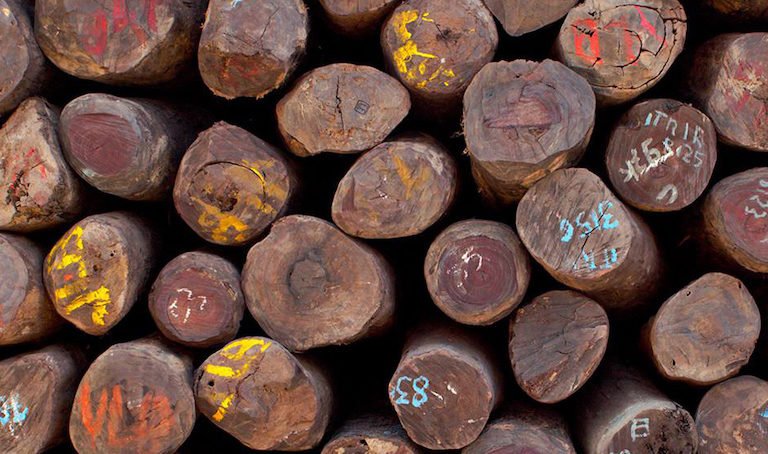- A timber trade agreement that aims to ensure Honduras exports only legally harvested timber products to the European Union is the first of its kind to go into force in the Americas.
- Under the framework, a timber legality assurance system currently under development will be the backbone of licenses for the export of legal timber and timber products.
- Indigenous and agroforestry groups that took part in negotiations leading up to the agreement say they hope the deal will spur action to address illegal logging and land grabs affecting forests and communities.
Community-based groups in Honduras have expressed optimism that a new timber export agreement with the European Union will help curb illegal logging and other illicit activities impacting the country’s forests and forest communities.
Nearly a decade in the making, the Voluntary Partnership Agreement on Forest Law Enforcement, Governance and Trade (VPA-FLEGT) took effect Sept. 1, the first of its kind to go into force in the Americas. FLEGT agreements ultimately seek to ensure that timber-producing countries only export legally harvested wood products to the EU. But the reforms and systems that need to be set up in Honduras to license legally harvested timber and timber products for export have much broader implications for forest governance and traceability.
“We hope that with improvement in governance in the forestry sector, illegality will be addressed, because that is the biggest problem we have,” said Norma Rodríguez, president of the Honduran Federation of Agroforestry Cooperatives, or FEHCAFOR. “Those of us who work with legal timber cannot compete.”
FEHCAFOR represents 96 agroforestry cooperatives with more than 6,000 total members in 10 of the country’s 18 departments. They produce a variety of forest products, from timber and furniture to pine resin, honey and pine needle crafts. The federation has a sawmill and exports some timber to El Salvador and to a lesser extent to Nicaragua, but most timber and other products produced by FEHCAFOR member cooperatives stay in the domestic market.
“Working legally in the country is quite expensive,” Rodríguez told Mongabay. Local sustainable forest management and reforestation, fulfilling a legal provision to plant three trees for every one harvested, is not the issue for cooperatives. It is all the paperwork, waiting and follow-up required for approvals of forest management plans, operating plans, and transport guides. Sometimes there will be more than one government forest technician involved over the course of a single application, which results in conflicting requests for changes to management plans prior to approval, Rodríguez said.
“We have had processes for the development and approval of a management plan that have lasted two and even three years,” she said. “It is years of delays and that drives up the cost. Meanwhile, someone who goes and picks up a chainsaw and gets timber does not wait.”
FEHCAFOR participated in the VPA negotiations, which started in 2013, alongside government agencies, the logging industry, small businesses, other agroforestry associations, an Indigenous confederation, international cooperation programs, academics, professionals, and other civil society groups. It was an eye-opening and valuable process, taking into account the existing legal framework and the concerns and priorities of diverse actors, according to Rodríguez. Many of the groups, including FEHCAFOR, are involved in committees and working groups that will continue to participate in the implementation of the VPA.
From agreement to practice
Fifteen countries have signed or are negotiating FLEGT agreements with the EU. And while they all include eventual FLEGT licenses for legal timber and timber product exports to the EU, the agreements are tailored for each country. The Honduran VPA also includes licenses for the regional market in Central America as well as records of legality for the national market. A Honduran timber legality assurance system, SALH, will be developed and will function as a backbone for the eventual application of the various licenses.
To get the ball rolling, the VPA joint committee for implementation held its first meeting in late September. The committee approved a plan for an SALH pilot project in five municipalities in the central-eastern region of Honduras, where 70% of pine timber extracted from forests is found, according to the EU delegation in Honduras.
“The pilot project intends to reduce bureaucratic administration processes and build a digitized system to control the traceability of timber from forests to the primary industry in this first step,” the EU delegation told Mongabay in an email.
“This implies reviewing and adjusting forestry regulations as well as strengthening the capabilities of all actors involved, especially the government to demonstrate compliance with the law,” the delegation said. “A great challenge is maintaining the interest and involvement of all the actors in the development of the SALH.”
Implementation is always the crux of any policy or agreement, said Déborah Sánchez, the forest, climate and biodiversity coordinator of the Mesoamerican Alliance of Peoples and Forests. The VPA may be great on paper, but how it will get off the ground in a way that will not maintain or exacerbate disparities in access and advantages between bigger logging companies and remote communities is less clear, she said.
“What we need to work on now is the how. How will this be achieved? How will there really be full, effective participation? That is where we always fall short,” Sánchez, who is Honduran, told Mongabay.
The Mesoamerican Alliance has been advocating for direct funding to Indigenous communities and local governance institutions rather than international financing through intermediaries. But according to Sánchez, over the past decade international cooperation funding has shifted away from community forestry and forest management even though they are directly related to climate change, which is now a funding priority. Within Honduras, funding can be a roadblock even for basic enforcement.
“The government’s own institutions do not have resources. Vehicles do not run. There is no fuel to go carry out inspections. If you report cases of deforestation, they will not be handled because there is no capacity,” Sánchez said.
Honduras has the highest percentage rate of deforestation in Latin America, losing on average 2.2% of its forests annually between 2000 and 2015, according to the U.N.’s Food and Agriculture Organization. Illegal logging, the expansion of the agricultural frontier, oil palm plantations, mining, cattle ranching and subsistence fuelwood collection are some of the main drivers of deforestation across the country.
In the Moskitia region, home to Indigenous Miskitu, Tawahka, Pech and Garifuna peoples in the northeastern corner of Honduras, there is a dangerous confluence of land grabs, cattle ranching, drug trafficking and illegal logging. Most of the Moskitia, a mix of tropical rainforest, pine forest and wetlands, is accessible only by air or water, and it includes important biosphere reserves. Most of it is also officially recognized Indigenous territory.
Twelve Indigenous territorial councils manage communal titles to roughly 15,000 square kilometers (5,800 square miles) of land in total. The bulk of the titles were issued nearly a decade ago, but the government has never followed through with the necessary next step of saneamiento, a verification and remediation process to address third-party presence and activity inside titled lands. The lack of that crucial step is also a major issue in other titled Indigenous territories and communities in northern Honduras and eastern Nicaragua. The lack of enforcement and attention also encourages further incursions.
“There is the issue of drug trafficking, the issue of extensive cattle ranching, and of illegal land grabs, but most of the land grabbing is by disguised campesinos,” said Donaldo Allen, president of the Confederation of Autochthonous Peoples of Honduras (CONPAH), which includes some of the many Indigenous federations and organizations in the country. Politicians, businesspeople and others often initially send in small farmers to take over land on their behalf, he said.
Invasions and incursions into titled Indigenous lands in the Moskitia continue, often by heavily armed people, Allen said. The previous right-wing government of Juan Orlando Hernández had deployed military forces to address illegal logging and other issues in the Moskitia, to little effect. Hernández left office in January this year, after eight years as president, and was extradited to the U.S. a few months later to face drug trafficking and weapons charges. In May, the new left-leaning president, Xiomara Castro, announced that military “environmental battalions” would deploy to the Moskitia and other areas with high deforestation levels.
“The military and police are not doing anything in favor of Indigenous peoples,” Allen told Mongabay, adding that they do not seem to have orders to actually go and deal with illegal incursions and land grabs in the Moskitia.
“Neither the right-wing nor the left-wing government have given respect to Indigenous peoples and our historical rights,” he said. “The current president is not fulfilling all the expectations Indigenous peoples had or have had for her.”
Allen said he is proud of and optimistic about the FLEGT agreement, though. CONPAH was an active participant in its development and will continue to work on its implementation. At the same time, they are working on demanding the government follow up on the issue of saneamiento to address the incursions into titled forests and communities. “Without that process,” Allen said, “it will continue to affect us greatly.”
Banner image: Imports of timber from Honduras into the EU are to be more closely watched after the first VPA-FLEGT in the Americas came into force recently. Image by Krzysztof Kowalik at Unsplash.














